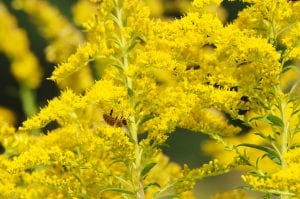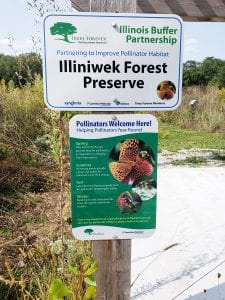Master’s Degree Project by WIU Alumnus Attracts Endangered Bee Species
MACOMB/Moline, IL – The sting of a single bee has elevated the graduate school project of a Western Illinois University alumnus into a home for an endangered species.
Ross Smith received his master’s degree in Recreation, Park and Tourism Administration (RPTA) in 2018. For his final project, Smith transformed two underutilized baseball diamonds in Hampton, IL, into a prairie area for the Rock Island County Forest Preserve District, where he has been employed since 2015.

A prairie restoration, completed by WIU alumnus Ross Smith as part of his master’s degree work, has attracted an endangered species of bumble bee.
“The baseball diamonds were underutilized, compared to neighboring diamonds and with the Dorrance Forest Preserve hosting diamonds, and grant funding available, it was a no-brainer,” said Smith. “We did a multi-year count of the number of users and the county board approved the new use for the property. This went hand-in-hand with the project I needed to complete to graduate.”
The Illiniwek Forest Preserve Project was created through this process and, in mid-August, the site became one of just a few nationwide to boast sightings of the endangered Rusty Patched Bumble Bee. The sighting was confirmed by an entomologist at Black Hawk College in Moline, IL. The species was added to the Endangered Species list in 2017 and was the first bumble bee in North America to find protection under the Act.
“The bee has a small, little rusty patch on its abdomen, below its wings,” said Smith, a Perry, IL, native. “We put signage about it on our trails so people know to watch for it.”
Other signs at the site educate visitors about the restoration of Oak Savanna trees, which were planted by a local YMCA after school group, and the migration pattern of Monarch butterflies, which was aided by a grant from Monarch Watch. The grant paid for 1,500 milkweed plugs, which were planted at the site by volunteers to attract butterflies.

The prairie is seeded with native plats, which attract bees and butterflies.
“The endangered bee had been spotted in Peoria, Rockford and Iowa City, and all of those come together here, so we were excited to find one,” he said.
The same YMCA after school group helped Smith add a habitat for bees at the site, which is composed of branches, stones and bricks.
Finding the endangered bee species hopefully opens new sources of funding for the forest preserve district, including the ability to apply for grant money to further enhance the habitat.
Through his prairie restoration project, Smith created partnerships with Pheasants Forever, the U.S. Fish and Wildlife Service, Trees Forever, River Action and local Boy Scout troops. The five-acre site, which sits on the banks of the Mississippi River, includes a hiking trail, which is maintained by the district, as well as a sheet metal replica of a bison to show the size of the animals that once freely roamed the area. There is also a pergola with a picnic table at the site, which was completed as an Eagle Scout project.
 In true Leatherneck fashion, the native plantings at the site bloom purple and gold, and a trail camera snaps a photo of the site each day.
In true Leatherneck fashion, the native plantings at the site bloom purple and gold, and a trail camera snaps a photo of the site each day.
Smith completed the project under the guidance of WIU RPTA Professor Rob Porter, who maintains the prairie plantings on WIU’s Quad Cities campus. Porter said the Spring 2019 flooding on the WIU campus in Moline, IL, brought invasive species into the campus plantings and destroyed them. He said he may have Smith help students rebuild the WIU prairies, but, until then, WIU graduate students are using Smith’s project site for prairie studies.
“I am super proud he got to be involved in something like this,” Porter said of the restoration.
Smith didn’t hesitate with an answer when asked what the most valuable lesson he learned during his graduate school project.
“Patience,” he said. “The restoration is like Rome, it wasn’t built in a day. I also learned a lot of native plant species. This is 1,000 years of evolution in one place – it was destroyed in a generation and we’re trying to put it back in a generation.”
For more information about WIU’s RPTA program, visit wiu.edu/RPTA.









